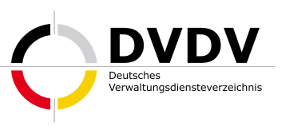The German Administrative Services Directory (DVDV) is the cross-disciplinary and cross-administrative infrastructure component for the secure and reliable addressing of automated services and specialized procedures for communication between and with public administration authorities in Germany. This enables e-government transactions to be carried out on the basis of service-oriented architectures in a secure and legally binding manner. The DVDV is provided in a cooperative operator model by the (German) Federal Government, federal states and local authorities and is being further developed as a product of the IT Planning Council under the joint responsibility of the Federal Government. It is open to all electronic public administration services that are processed automatically in the form of machine-2-machine communication.
Communication is XML-based and is secured via the secure OSCI transport standard.
DVDV 1 was launched in January 2007 and was the first service to implement cross-state data transmission in accordance with the Registration Law Framework Act. In the meantime, a total of around 130 services and specialist procedures have been connected. These include, for example, the civil status, registration, foreigners, passport and ID card systems. The central DVDV-Bundesmaster is operated by the ITZBund and was created and maintained jointly by Governikus and Dataport.
Further information can be found on the project page at ITZBund.






